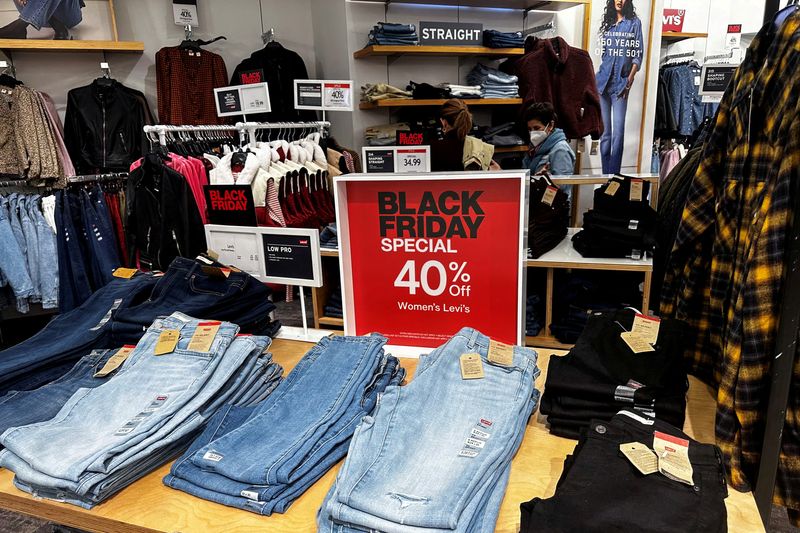By Lisa Baertlein and Arriana McLymore
LOS ANGELES/NEW YORK (Reuters) - As holiday shoppers return items purchased during Black Friday and Cyber Monday online shopping sprees, more U.S. retailers could tell them to keep items that cost more to ship back than they are worth.
This year, 59% retailers offer so-called "returnless" or "keep it" policies for unwanted products whose returns costs exceed their value, according to returns services firm goTRG, which surveyed 500 executives at 21 major retailers, including Walmart (NYSE:WMT) and Amazon.com (NASDAQ:AMZN).
Last year, 500 retail executives said 26% of companies had such policies, said goTRG CEO Sender Shamiss, whose company counts Walmart among its clients. They didn't break out the number of companies involved in last year's survey.
As retailers adopt technology to root out excess costs, more are embracing returnless policies for certain online purchases, said Shamiss, who declined to name companies that use them. That information is "not something that retailers want out there" due to worries the policies could be abused by shoppers, he said.
The previously unreported survey results come as U.S. shoppers are expected to return $173 billion worth of holiday purchases in the U.S. this year, 28% more than last year, according to Optoro. The firm helps retailers manage returns, which typically rise after pre-Christmas sales like Black Friday and Cyber Monday and continue beyond Christmas.
"Our returns Super Bowl starts the day after Black Friday and goes into February," said Optoro CEO Amena Ali, comparing her sector's busy season to one of America's biggest sporting events.
The typical return costs retailers about $30. Returns drain profits because they must be transported, sorted and resold - often at a discount - or disposed of at a loss. That has helped prompt almost 90% of retailers to revise a range of policies this year, Ali said. Those changes also include offering store credit, charging for some returns and encouraging shoppers to bring online purchases back to physical stores.
"You just can't afford to ignore it," she said of returns costs.
Reuters recently viewed a Walmart YouTube tutorial from February that helps marketplace sellers set parameters for their own return-less policies.
Walmart said it balances customer experience and its bottom line when considering exchanges and returns. That includes testing ways to help third-party sellers manage costs. The company called the training video out of date and it is now labeled private. Seventeen shoppers interviewed by Reuters said companies including Amazon.com, Chewy (NYSE:CHWY).com, eBay (NASDAQ:EBAY), Temu, Keurig, Wayfair (NYSE:W) and t-shirt seller True Classic told them not to return goods valued from around $20 to as much as $300 - including several that were defective or shipped in error.
Amazon said it allows customers to keep items on "a small number of returns as a convenience and to help keep prices low." Wayfair customers in certain cases may have the option to keep items at a discount, according to the online furniture seller. Other retailers named by the shoppers did not respond to requests for comment.
THE RETURNS RUSH
The percentage of returns was nearly double pre-pandemic levels last year, standing at 16.5% of total U.S. retail sales - or $816.8 billion worth of goods, according to data from Appriss Retail and the National Retail Federation.
Sellers of underwear, bedding and food were among the first adopters of keep it returns due to hygiene concerns or health safety rules. Shapewear seller Shapermint uses the policy to build loyalty by asking shoppers to donate the items or gift them to friends, said Gabrielle Richards, brand director at Trafilea, which owns the company.
The practice went mainstream during the e-commerce boom of the early pandemic, when shipping and delivery costs soared and warehouses were bursting at the seams. Companies stopped taking back unwanted t-shirts, pet toys or furniture that would increase costs and add to supply-chain backups.
These days, retailers weigh the cost of the return against the value of the shopper, with big spenders more likely to be eligible, experts said.
Eight of 17 shoppers interviewed by Reuters were told to keep goods purchased on Amazon.com, mostly from outside sellers. Items ranged from low-value goods like underwear and a raincoat to an incorrectly-sized mattress.
Amazon, Shapermint and other retailers battle potential fraud with technology that enables them to extend the service to trusted customers.
"We take fraud very seriously and when bad actors attempt to evade our controls, we take action and work with law enforcement to hold them accountable," Amazon said.
Some sellers' anti-fraud efforts have alienated shoppers.
Los Angeles-based photographer Pamela Peters late last summer got a refund for a $300 portable air conditioner that blew hot air - but only after she sent the Amazon seller a picture of the unit with the power cord cut.
"It's so wasteful," said Peters, who disposed of the unit before buying a replacement from a different retailer.
